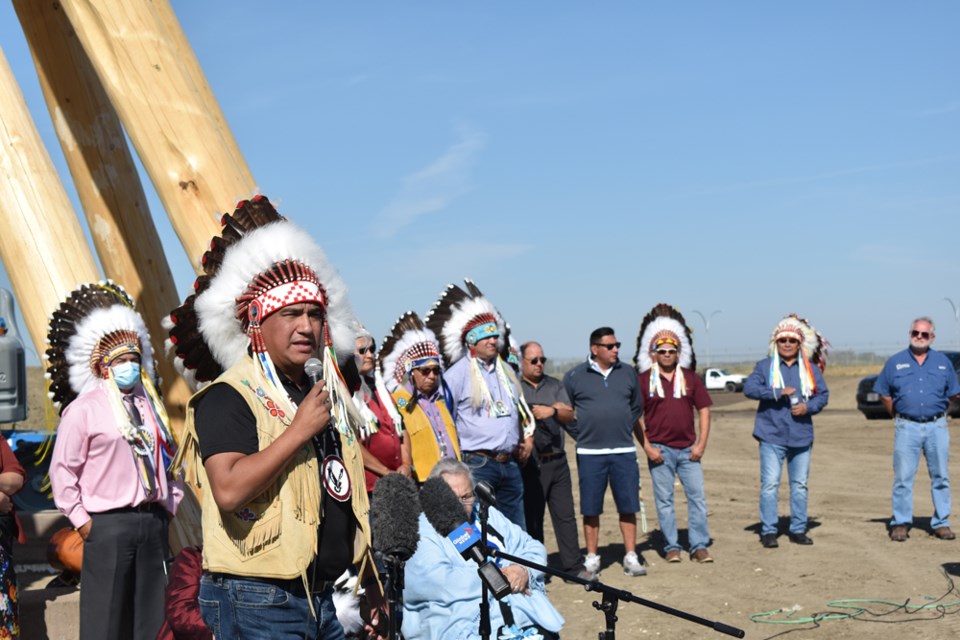SASKATOON — Kahkewistahaw is a Plains Cree word that means an eagle flying or soaring in the air, which was explained by Federation of Sovereign Indigenous Nations Chief Bobby Cameron. Call it coincidence or a symbolic gesture by the great spirits giving their blessing, when a pair of eagles were spotted soaring above the 40-acre property that’s going to be developed by the Kahkewistahaw First Nation.
Mayor Charlie Clark and KFN Councillor Corey Alexson saw the eagles while several members were doing apipe ceremony inside another teepee, which the former described as a “chilling way to start off this day.”
Cameron, Clark, the FSIN leadership, and other tribal chiefs of different councils joined KFN Chief Evan Taypotat in the ceremony completing the construction of a teepee that was erected in front of the new FSIN office being built. The teepee has been part of the culture of First Nations people with the structure serving as a symbol of pride and unity.
Taypotat said KFN and Kahkewistahaw Trust bought the 40-acre property near the Saskatoon John G. Diefenbaker International Airport that will soon turn into a business hub, benefitting not only the Indigenous population but the entire city.
“The biggest thing we’re doing on Kahkewistahaw is simple, we’re trying to achieve sovereignty through economic development.”
“In 2017, when I was elected along with four councillors — Alexson, Michael Bob, William Kaysaywaysemat, and Iris Taypotat-Scribe — we sat the first week together and said, 'OK, we won the election, now what are we going to do?' The conversation was, we can wait for the government to do something for us, or we can do something for ourselves,” said Taypotat.
“And that’s what we did. The government will never honor the Treaty the way that it’s supposed to, that’s a fact. They’ll always give us just trinkets just enough to get by. We said, as a council, we’ve never been one to stand around and feel sorry for ourselves. Let’s do something about it.”
He added that KFN’s other properties are a property in Yorkton currently being leased by a casino, and a hotel and gas station. Other KFN-owned businesses are Kahkewistahaw Sand & Gravel Limited, which develops high quality road gravel, and Kanatan Energy, which aims to promote alternative energy sources, the excess of which can be sold to SaskPower.
Taypotat said it is important to have the support of the leadership from different Indigenous and First Nations groups.
"This land is not only for Kahkewistahaw First Nation. It’s for every other First Nation in Saskatchewan. If a First Nation is dreaming of having a McDonalds or having Costco, dreaming of having any type of business that they see and they want to be part of what we’re building in Saskatoon, then come with us. Let’s walk together. We’re stronger together. We’re stronger in numbers and we’re open to any type of relationship. Anything that you want on this land, we’re open to that.”
He also acknowledged Mik Cupial, the chief executive officer of KFN’s economic development team, who helped them in making the land deal a reality.
“He’s the man that helped us develop this land because there was a lot that happened just to be here today. Four years’ worth of good and difficult meetings, but meetings that needed to happen and needed to be successful in order for us to get here.”
Taypotat said they are set to open a gas station later this year while in development is a medical marijuana and tobacco store. The biggest project in development is a hotel and convention centre, next to the FSIN office that’s also being constructed.
“The vision is to have our own convention centre. A big part of it is to have FSIN’s buildings (office and storage facility). We want to have it all together. We always know we have assemblies. We know a lot of our First Nations brothers and sisters have meetings … we want to cater to every First Nation, every Metis, every Inuit, every Indigenous need to be on this land.”
The event was highlighted by the teepee raising ceremony where Cameron helped put the final piece.
“The logs used as the poles for the teepee were flown in from Bella Bella, British Columbia, and are approximately 400 years old. They will stand in front of the new home of the FSIN for the next 400 years. We are thankful to have this strong foundation being laid and to have these beautiful logs arrive from B.C. with the help and through a partnership with the TV show Timber Kings.”





